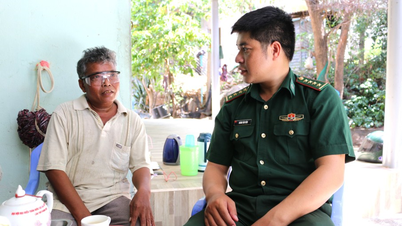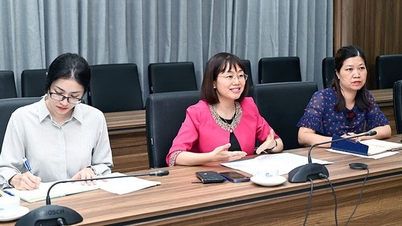Pregnant for the second time at the age of 39, Ms. Tran Thi Tr. (living in Hoang Mai district, Hanoi ) said that compared to the first birth 5 years ago, her health has clearly declined.
Women give birth later
According to Ms. Tr., the second pregnancy made her feel very tired, even after eating she just wanted to sit and rest instead of cleaning up right away like the first pregnancy. "We were worried about the risks of giving birth at the age of nearly 40, so before getting pregnant, my husband and I went to the doctor for advice and when the fetus was 10 weeks old, we took the initiative to have a comprehensive prenatal screening," said Ms. Trang.

Giving birth after the age of 35 will have many effects on the health of both mother and child.
At the Central Maternity Hospital, Ms. Hoang Thanh H. (41 years old, living in Tay Ho district, Hanoi) and her 47-year-old husband came to see a doctor for advice with the desire to have more children. Ms. H. said that her two sons were grown up and the whole family wanted to have more children to "bring joy to the family". "We know that pregnancy at this age is difficult and has few opportunities, but with the advancement of medicine, my husband and I hope this wish will soon come true" - Ms. H. expressed.
Records at medical facilities show that the reality of giving birth at an older age and the effects on the health of the mother and baby is not uncommon. Ms. Vu Thao N. (42 years old, in Nam Dinh ) recounted the haunting experience of preeclampsia at the end of her pregnancy, which was life-threatening. Fortunately, she received timely emergency care, but her health declined. Her son was born prematurely, underweight, and now nearly 3 years old still cannot speak. After examination, the doctor diagnosed that the child was severely malnourished and had signs of autism.
According to the results of the population change survey, the trend of marriage in Vietnam with the average age has increased significantly, even in some localities men are nearly 30 years old before getting married. In particular, having more children is also a current trend although many families have older mothers, even over 40. The reason is partly due to late marriage leading to late childbearing. In addition, many families have better economic conditions so even though they are older, they still want to have more children. In addition, many couples are subjective, do not use contraception leading to unwanted children.
Reduce the risk of giving birth to a child with birth defects in your forties
Due to the increasingly popular trend of late marriage and childbearing, many mothers are having their first child at 34-35 years old.
Dr. Phan Chi Thanh, Chief of Office of the Training Center, Central Maternity Hospital, said that the older the mother, the higher the risk of the child having congenital malformations and slow neuromotor development. When pregnant with the first child after the age of 35, women are at higher risk of high blood pressure, preeclampsia, and diabetes. The fetus is also often in a more dangerous condition than other mothers, such as the risk of ectopic pregnancy, miscarriage, stillbirth, and cesarean section.
From these risks, Dr. Thanh recommends that parents should have prenatal and newborn screening to detect genetic disorders and diseases for both mother and baby.
In addition, with modern medicine, Dr. Thanh believes that women can choose to freeze eggs at medical facilities for later use. For women from 35 years old, if they are married and cannot get pregnant after 6 months, they should see a fertility specialist for advice as soon as possible. They should not wait any longer because the older they get, the more their fertility decreases.
If the mother is healthy, the baby will be healthy. Obstetricians also recommend that women have regular reproductive health check-ups. If you have chronic diseases such as diabetes or high blood pressure, you need to be treated and advised by a doctor to control these conditions well during pregnancy.
For men, although fertility will last longer than for women, sperm in older men often have more genetic abnormalities than in younger men and the ability to fertilize eggs will also decrease significantly. Therefore, doctors recommend that "men" choose to have children when they are young, preferably before the age of 45.
Having a disabled child can be due to old parents
The Ministry of Health said that one of the causes of birth defects in children is the age of the parents. Mothers over 35 years old and fathers over 45 years old have a high risk of giving birth to disabled children.
By age 40, about 75% of eggs have chromosomal abnormalities, which reduces the chance of pregnancy and increases the risk of miscarriage.
Studies show that for a 25-year-old mother, the rate of giving birth to a child with Down syndrome is only 1/1,250 cases; 1/952 for a 30-year-old mother; 1/378 for a 35-year-old mother; 1/30 for a mother over 45.
The rate of miscarriage, pregnancy complications, and the risk of ectopic pregnancy all increase after age 30, especially after age 35.
At age 20, the rate of cesarean section is about 30% but increases to 43% at age 35.
Currently, Vietnam has about 1.2 million disabled children aged 0-17, a rate of 3.1%. The most common types of disabilities in children are motor and language, of which congenital factors account for 55%-65%, the rest are due to illness.
Source





























![[Photo] National Assembly Chairman attends the seminar "Building and operating an international financial center and recommendations for Vietnam"](https://vphoto.vietnam.vn/thumb/1200x675/vietnam/resource/IMAGE/2025/7/28/76393436936e457db31ec84433289f72)






































































Comment (0)